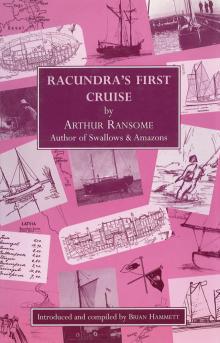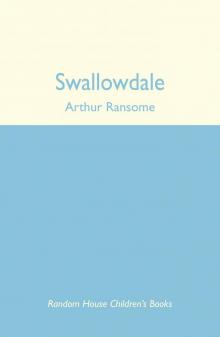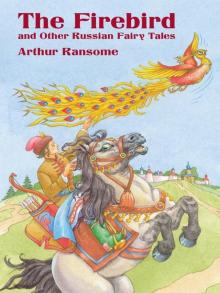- Home
- Arthur Ransome
Great Northern? Page 7
Great Northern? Read online
Page 7
That was enough. The explorers turned and ran, and at that moment, far away, they heard the long drawn hoot of the Sea Bear’s foghorn.
“She’s afloat,” said Titty. “We ought to have turned back long ago.”
“We’re done,” said Dorothea. “We’ll never get there before that Gael catches us. I do hope Dick’s gone back already.”
“He’ll have heard the foghorn,” said Titty.
“Not if he’s looking at birds,” panted Dorothea.
“That man’s stopped running,” said Roger.
They paused and looked back. The man had indeed stopped running, but he was shouting his Gaelic and someone they could not see was answering him.
“He’s shaking his fist at us,” said Roger.
“Don’t stop,” said Titty, “he’ll only come after us again.”
“And we’ve got to find Dick,” said Dorothea.
The three explorers hurried on down the valley to the lochs and were presently looking for Dick along the rocky shores.
“What would have happened if they’d caught us?” said Roger.
“Native trouble,” said Titty. “Just what we’ve got to keep out of. But anyhow we’ve been beautifully stalked.”
CHAPTER VI
FIRST SIGHT OF THE BIRDS
DICK, NOTEBOOK IN one hand, pencil in the other, telescope lying handy and triumph in his heart, crouched among some rocks on the shore of the upper of the two lochs. For the first time in his life he had seen a Diver. After leaving the others at the Pict-house, he had gone straight to that upper loch, so that, if the signal for return came too soon, he would at least be able to pass the other loch on the way back to the ship. Almost at once he had seen one of the birds the thought of which had leapt into his mind the moment he had known that he and Dorothea were to join the others in a cruise among the Western Isles. He had heard it, even before he had seen the long line of splashes far out that showed where a largish bird had taken to the water.
“Cuck … cuck … cuckcuckcuck.…”
He had never heard a cry quite like it before. The splashes had shown him where to look, but in the rippled water he found it very hard to see the bird. Something was moving on the water out there. But what? The wind made things very difficult. Every time he had caught sight of the black moving spot he had lost it again before he had been able to bring his telescope to bear. The wind was blowing from behind him over the loch, so that the roughest water was on the far side, where that bird had come down. At first, he had hardly let himself hope it was a Diver. It might have been a duck, or any other largish bird. Whatever it was, he would wait until he knew for certain.
There had come a lull in the wind. Smooth water spread out over the loch from the shore, and far out on the loch he had seen the bird swimming out of the rippled water into the smooth. As he watched, it disappeared. It had come up again, nearer. He had known then that it was a diving bird of some kind. It was swimming low in the water. Very like a grebe. It must have gone under and come up again without a splash. No. It did not always go under like that. He had seen it hump itself above the water, half rise and go down as if it had taken a header. It had come up again, a minute later, and he thought it had brought something with it. There had been splashing for a minute or two after it had bobbed up. It had probably got a fish. The bird was a bit big for a grebe. Dick had crouched, hardly daring to move while he took off and cleaned his spectacles and, finding that made no difference, unscrewed and cleaned the eye-piece of his telescope, misted over with his breath.
When he had screwed it back on the telescope and looked again the bird had gone. Then it had come up much nearer than it had been. It was swimming straight towards him and now, in smooth water, he had a chance of seeing what it was like. In spite of all that he could do to keep them steady, his hands had begun to shake. The bird had dived again. There was no splashing when it came to the surface. Either it had caught only a small fish and swallowed it without a struggle, or else it had failed to catch a fish at all. Dick was almost certain that he knew now what it was. Nearer the bird had come and nearer yet.
“It is,” Dick said in a whisper. “It must be.”
Resting the telescope on a rock, he had at last got a steady view. He had seen a black and white dappled back, a greyish head and nape, a neck striped black and white at the sides, and a broad stripe of black down the throat.
There could be no doubt about it. “Black-throated Diver,” he had whispered reverently, put down the telescope, pulled out his pocket-book and added that name to his list of birds seen on the cruise.
For hour after hour he had stayed there watching that bird diving, coming up again, dipping its head under water as if to peer into the depths and then diving again. He had made a drawing of it and then another, showing the markings just so that he could compare them with the pictures in his book, but he knew for certain what it was. Then, at last, a long line of splashes had shown that the bird was getting up off the water. Again he had heard that strange “Cuck … cuck … cuckcuckcuck.” He had seen the bird in flight, like a cigar with busy wings. It had circled overhead and flown away as if towards the lower loch, but he had seen it swerve southwards and then had lost sight of it altogether.
Dick put his notebook back in his pocket. What matter now that the cruise was ending? He had seen a Diver with his own eyes. He wanted to tell Dorothea. The others would hardly guess how pleased he was.
He stood up, rather stiffly, took his glasses off, cleaned them, put them on again and looked up to the little hill where he had left the three explorers on the top of that prehistoric dwelling-house. There was nobody there now. He looked along the ridge with a gap in it where that cart track climbed over into the next valley. Nobody there either. He looked up the valley towards the hills and saw specks moving against the heather. He thought he heard a shout … probably Roger. Well, if they had gone so far, they would soon be turning back and coming to look for him, and he knew there would be small chance of watching birds with Roger larking round. That bird had done its fishing and flown away. He could do no more here, but there was the other loch to see. He had better go and have a look at it while there was still time, though there was not likely to be anything there so well worth looking at as that Black-throated Diver. That sort of good fortune was not to be expected twice in an afternoon. Dick did not care. Already his day was the most successful of the whole cruise.
Rejoicing in what he had already seen, he walked along the shore, sometimes having to climb up into the heather, sometimes dodging marshy bits, sometimes finding it hard to keep his footing on loose stones. It was slow going along the shore, but he came at last to where the loch narrowed into a stream flowing through the flats that divided one loch from the other. Once upon a time, thought Dick, looking at those flats, the two lochs must have been one. Perhaps, he thought, when the ancient Picts had built that place on the hill, the whole valley had been one great lake, or even an arm of the sea.
He saw a dipper, bobbing its white shirt front, on a stone in the stream, but did not bother to put it in his notebook. He had seen dippers before. A family of baby water-hens scuttered across and a mother water-hen flapped along close to the bank on which he was walking, pretending to have broken her wing and trying to draw him after her, to give her young ones time to get away. But that, too, he was not seeing for the first time. On a day when he had seen a Black-throated Diver, dippers and water-hens did not mean as much as usual. Presently he was skirting wide reed-beds. The lower loch lay before him, and as he looked at it and at a little island far out towards the middle of it, he became alert once more. After all, seeing one Black-throated Diver need not mean that he would never see another.
Three Mergansers came flying together from the foot of the loch, lifting suddenly at the sight of him, but flying straight on over his head. Dick watched the quick black and white flashes of the three birds until he could see them no more and knew that they must have dropped to the water in the loch that he
had just left. He wrote “Three Mergansers” in his notebook and thought of going back there to have another look at them. He looked at his watch. The afternoon was gone and it seemed to him that he had only just begun his day. But now, at any moment, he might hear the Sea Bear’s foghorn telling him that the day was over. It would be silly to go back now.
Beyond the reed-beds, the banks of the loch rose higher and Dick kept close along the water’s edge, knowing that a bank behind him was as good as rocks in front by way of cover. The one thing you must not do is to let birds see you against a background of sky. He went very slowly along the edge of the loch, looking this way and that over the water but mostly towards the little island. No matter what birds might be about, he knew that islands were magnets, alike for birds and for human beings. And this particular island was a very good one. Reeds at one end of it, boulders in the middle and, as he now saw, a flat bit of grassy shore at the end furthest from the reeds. What was that, swimming not far from it? Dick’s heart leapt again. Whatever it was, it looked most awfully like that Diver. Perhaps he had been wrong in thinking it had flown south and out of the valley.
There was water at his feet and small stones, but a few yards further on he saw there was a rock big enough to give him cover and a place behind it that might have been designed for the comfort of a bird-watcher. He crept on, dropped beside the rock, pulled out his telescope, focused it on the island and searched the water where he had seen that swimming bird.
Thank goodness the wind had gone and the waves with it. The water was still and the sun, well away to the right over the western hills, was not in his eyes. But there was no bird … and then, in the circle of smooth water he could see through the telescope, there were ripples on one side. He followed them to their centre and found the bird. It had just come up and he saw it dip its beak and lift its head as if swallowing a drink. There it was, swimming, its body low in the water, its neck lifted, its head turning now one way, now another. It was a Diver all right. Lucky he had not gone back after the Mergansers. He made up his mind to stay exactly where he was. He could hardly be in a better position from which to watch it.
The Diver was swimming towards the island, and Dick was following it with the telescope, when he saw something blackish move on the flat grassy point of the island, a few feet from the water. Yes. It moved again. For a moment he thought it was some sort of animal. Then he saw that it was a bird, moving in an odd way, as if it could not get properly on its legs. It shuffled along the ground until it almost fell into the water, when at once, it swam off, another Diver, like the first. He was sure now that it was the bird he had seen on the upper loch together with its mate. “Exactly like grebes,” he thought, watching the two swimming together. “Like grebes, only enormous.”
“Hoo … hoo … hoo!”
He was startled by a long wavering cry. It was like wild laughter, as if the two great birds were sharing some fantastic joke.
“Hoo … hoo … hoo!”
He heard it once again but no more. Both birds dived together. They came up wide apart.
One of them was swimming towards the island. He could not be sure if it was the same one that he had seen launch itself into the water, but it landed at that same place. Whether it was the same bird or not, it had that same weakness in the legs. it seemed to slide itself along the ground, helping itself with its wings. It stopped close to the water, just where he had first seen a bird move.
Through the telescope he could see the long mottled body of the bird, resting low on the ground. The other Diver was swimming about, moving further and further from the island, diving now and again, staying under water a long time and coming up sometimes where Dick was expecting to see it, and sometimes in quite a different place. The bird on the island scarcely moved.
“If it’s nesting,” thought Dick, “its eggs can’t have hatched yet. Or only just. But it’s too far off to see them.”
He kept perfectly still and watched, keeping the telescope trained on the sitting bird, thinking that if it moved again he would be able to see what sort of nest they made. There might be no nest at all. He remembered puffins and shelduck and their use of rabbit holes, and the many birds that laid their eggs on the bare ground, lapwings nesting in open fields, gulls with their eggs hard to see among the pebbles. He wondered whether these Divers took turns to sit on their eggs. If so, he wished the swimming bird would not take quite so long a turn in the water. At any minute now, Titty and Dorothea and the noisy Roger might be coming to hurry the Ship’s Naturalist back to the ship, not thinking for a moment that his adventure, of lying still and watching two dark blobs through a telescope, was more exciting than any they could have. Carefully he turned his head, but the bank above him made it impossible for him to see if they were coming down the valley. He turned back to his birds.
He wished he had had Captain Flint’s big binoculars instead of the little telescope which, useful as it was, did not show things large enough to let him see much at this distance. If only he had had a boat, so that he could row out nearer to the island and see what sort of nest the Divers made.… He thought of the folding boat carried on the Sea Bear’s deck. But it was no good thinking he could persuade the scrubbers and painters to leave their job and bring it ashore and carry it to the loch. And anyhow, it was too late. There was a nest there all right. He was sure of that. Dick pulled out his notebook and scribbled in it, “Pair of Black-throated Divers on the lower loch. Nesting.”
Five minutes later, he pulled out the notebook again and put a question mark against what he had written. It may have been that the trout in the loch had begun their evening movement towards the shore and the Diver was moving after them to better fishing grounds. The swimming bird, with one dive after another, had come nearly half way from the island towards the place where Dick lay hid. He was getting a better view of it each time it came to the top of the water. Its head seemed very dark on the top, and the whole bird seemed even larger than he had thought it at first sight. It dived, and came up a minute later with a fish, struggled with it on the surface, swallowed it, sipped water, and swam nearer still. Dick was puzzled, but he knew very well that nothing is more difficult to judge than the size of things seen at a distance through a telescope. The bird dived again. Dick watched the spot where it had gone under, but it must have been swimming straight towards him. When it came up it was no more than thirty yards off, and Dick was so startled that he nearly shouted aloud.
“It’s a Great Northern,” he said to himself, and had added it to his list before he remembered that Great Northern Divers did not nest in Great Britain.
“It can’t be,” he said to himself. “But it isn’t a Black-throated.”
He made rather a mess of the pages in his notebook where he had written of those birds. He had drawn a line through “Black-throated” and had written “Great Northern” before, remembering that there could be no nest, he put a line through that. He jammed down some question marks.
Again he had a good view of the bird and saw clearly that it had two patches of black and white stripes on its dark neck.
“It is a Great Northern,” he said, made another entry in his book, and then, looking out once more at that dark blob of the bird on the island, still where it was, he crossed it out again and turned over a fresh page.
If only he had had the bird-book in his pocket. There was no time to go and fetch it. The only thing he could do would be to make a sketch of the bird’s head and neck and compare it with the picture in the book when he was back in the cabin of the Sea Bear. He made a drawing, not as good a drawing as Titty would have made, but showing clearly just how those two striped patches were placed on its neck. There could be no doubt that, whatever the bird was, it was different from the Black-throated Diver he had seen. He sketched in a small picture on the same page to show what its head had looked like. There could be no mistaking them. And this new bird was certainly a Diver. And it was not a Red-throated Diver. There was not a touch of red about it.
What other Divers were there that it could be?
ANOTHER PAGE FROM DICK’S NOTEBOOK SHOWING THE TWO KINDS OF DIVERS
He was just finishing the drawing, had written “Great Northern Diver,” crossed it out, written it again, set a question mark beside it, and crossed out the question mark after yet another look at the bird, and put down a few more notes to help his memory, when he heard Roger call.
“Ahoy! Dick! Dick! Ahoy!”
Then Dorothea’s “Cooeee!”
The bird must have heard those shouts and seen the explorers. It was swimming fast towards the island, looking more than ever like a big grebe, swimming with its whole body under water and only its head showing.
Botheration! There was nothing to be done. Dick stood up, saw the explorers coming along at a jog trot and waved to them.
“Buck up!” shouted Roger.
Hurriedly stowing pocket-book and telescope, Dick climbed up from the shore.
“Back to the ship!” called Titty. “Quick.”
“Didn’t you hear the foghorn?” said Dorothea, without stopping.
“No,” said Dick.
“Ages ago,” panted Titty. “We thought you’d gone only Dot said we’d better shout in case.”
“Hurry, hurry!” said Dorothea. “We’ve been pursued. Hostile islanders.”
Dick found himself running with the others.
“Divers,” he said to Dorothea. “I’ve seen a Black-throated … And two I can’t make out.”
“We’ve been stalked,” said Titty.
“That man isn’t in sight,” said Roger.
“Booooooom!”
That was the Sea Bear’s foghorn again and, as he heard it, Dick half remembered hearing it before, when he had been too busy watching those birds.

 Peter Duck: A Treasure Hunt in the Caribbees
Peter Duck: A Treasure Hunt in the Caribbees Racundra's First Cruise
Racundra's First Cruise Great Northern?
Great Northern? Swallowdale
Swallowdale Swallows and Amazons
Swallows and Amazons Winter Holiday
Winter Holiday Missee Lee: The Swallows and Amazons in the China Seas
Missee Lee: The Swallows and Amazons in the China Seas Pigeon Post
Pigeon Post We Didn't Mean to Go to Sea
We Didn't Mean to Go to Sea The Firebird and Other Russian Fairy Tales
The Firebird and Other Russian Fairy Tales Coot Club
Coot Club The Big Six: A Novel
The Big Six: A Novel Six Weeks in Russia, 1919
Six Weeks in Russia, 1919 Secret Water
Secret Water The Big Six
The Big Six Missee Lee
Missee Lee Peter Duck
Peter Duck The Picts and the Martyrs
The Picts and the Martyrs